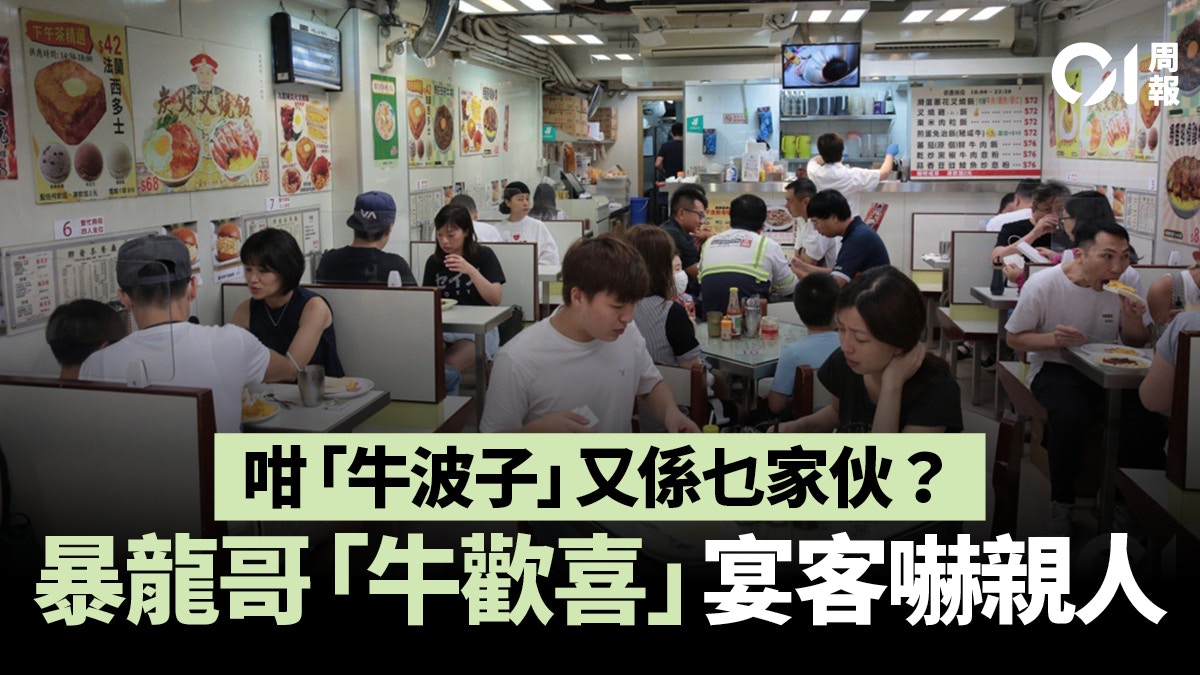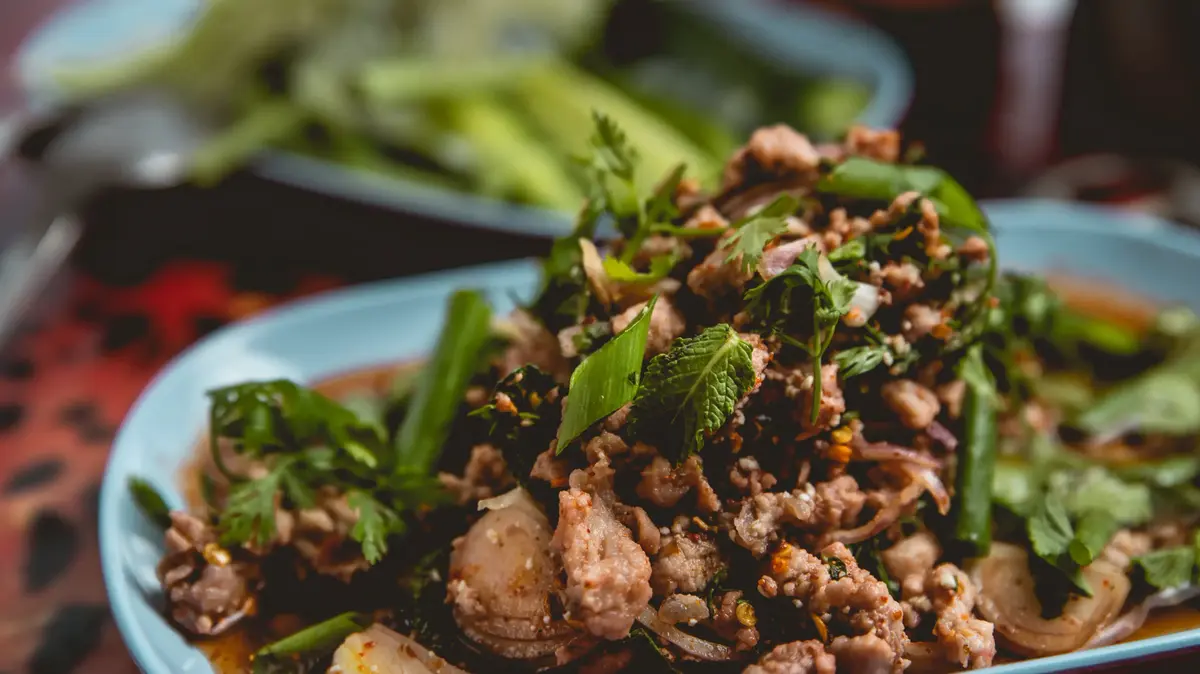When it comes to "puffed rice", the first thing most people think of is Japanese food. It is true that modern tea soaked rice is more common in Japanese cuisine, but it is certain that "puffed rice" is not unique to Japan.
As early as the forty-ninth chapter of "A Dream of Red Mansions" in the Qing Dynasty, there was a description of Jiangnan tea making rice: "Baoyu couldn't wait. He only made a bowl of rice with tea, and swallowed the pheasant and melon in a hurry." As a gourmet paradise, Hong Kong upholds the fine tradition of Cantonese food culture, and naturally there is also Cantonese-style "Pau Rice".
Earlier, a well-known soup and rice restaurant in Yau Ma Tei attracted many fans to make a "pilgrimage".
One of the most popular dishes is "Shenggua, Pig and Fish Soup Soup with Rice". Apart from its unique flavor, it is also reminiscent of taboos and euphemisms in Cantonese.
Cantonese taboos and place naming——From Kap Shuimun to Shun Tak Street, taboos and euphemisms in Cantonese in Hong Kong
Cantonese people pay attention to ideas and taboos. Even today, many people still inherit this custom consciously or unintentionally.
Check "pig gluten", which actually refers to "pig liver". The Cantonese pronunciation of "liver" (gon1) and "dried" (gon1) is the same. People in Hong Kong and Guangzhou generally regard water as wealth, and "there is water" for it. Rich," and "dry" symbolize "dry water" and "dry pond", which means "no money".
Out of the taboo of "dry" and the preference for "water", the "liver" was changed to "run" (moist), and the radical was changed to "meat", which became the self-created dialect word "膶", "" Pig glutinous rice "hence the name.
In the same way, Cantonese people used to call "chicken liver" "chicken glutinous rice", "dried bean curd" as "tofu glutinous rice", and "dried radish" as "radish glutinous rice".
As for "sheng melon", it was originally called "loofah", but because "silk" (si1) and "lose" (syu1) are similar in sound, the name "loofah" is easy to arouse the nerves of business people and gamers.
In order to "return a defeat to a victory", the Cantonese took the opposite of "lose" to "win", and changed "loofah" to "victory melon", which means victory, and called "cheers" as "drinking victory". Same reason.
"Han Shu.
The Biography of Li Shiqi states: "Food is the god of the people." When people in Hong Kong meet each other, they often greet each other with "Have you eaten?"
Linguistic taboos are no exception. Based on the "transcendent status" of "food", it is natural to have a good name for the food and the psychological expectation of getting a good head.
Here are some euphemisms related to food in Hong Kong Cantonese:
1. Cucumber
"Cucumber", formerly known as "cucumber", belongs to the Cucurbitaceae family.
"Gua" has the meaning of "death" in Cantonese, such as "gua Lao Lin" and "gua straight" in the idioms, which all describe the death of a person.
Since "death" is an absolute taboo, some commentators believe that the name "cucumber" is especially taboo for people with the surname Huang, so they took the outer color of the melon and changed "cucumber" to "green melon"; It is a common surname in Hong Kong, so the theory of "green melon" has gradually become mainstream.
Check the history of "cucumber". It was introduced into the Central Plains from the Western Regions by Zhang Qian during the Western Han Dynasty. Be Careful Twenty-One").
As a result, the current name of "green melon" is a product of "twice taboos".
In addition to its unique flavor, "Shenggua, Pig and Fish Soup Soup with Rice" is also reminiscent of taboos and euphemisms in Cantonese.
(provided by the author)
2. Prosperous vegetables
There are two kinds of food in Hong Kong called "Wang Cai". The first one is called "Chinese cabbage" by the northerners, which belongs to the vegetable category.
Another type of "Wang Cai" is seafood, originally called "mussels". As a common local food, it has been included in the "Database of Commonly Used Food Specifications for Small and Medium Enterprises in Hong Kong".
"Mussel" is made from dried mussels. It is not salted during processing and has a milder taste, hence the name "Mussel".
Li Shizhen's "Compendium of Materia Medica" records that mussels can cure consumptive exhaustion, lack of essence and blood, chronic vomiting of blood, bowel sounds and low back pain.
Cantonese people change their name to "prosperous dishes" because "light" has unlucky meanings such as "(business) weak", "(market) quiet" and so on.
Three, pig red
"Pig red" was originally "pig blood". Because it directly calls the animal raw material "blood", it is not only reminiscent of the disaster of blood, which is very unlucky, and swallowing "blood" makes people feel horrified and nauseated.
Therefore, in Hong Kong Cantonese, the finished product of poultry blood is generally called "red", "pig red" is used to refer to "pig blood", "chicken red" is used to refer to "chicken blood", and "red" is used instead of "blood". Mainly based on its color, authentic dishes such as "pig red porridge", "pig carrot" and "leek chicken red".
4. Niu Huanxi, Niu Whip, Niu Bozi
In the Hong Kong movie "Pulp Comedy", one of the scenes "Brother Tyrannosaurus" (played by Zheng Zhongji) entertains guests with "Niu Huanxi", which makes more people aware of this dish.
In fact, "Niu Huanxi" is an elegant name for "cow's labia", which is a part of the cow's body; in recent cases, "whip" is used as an "animal penis", such as "bull whip" and "tiger whip". .
In addition, Cantonese people love to eat beef offal, and the ingredients include "Niu Bozi", which was originally "beef testicle".
The examples of "whip" and "wave" both use "shape" as a euphemistic substitute.
Beautify the name of the food to avoid the embarrassment of diners saying "cow labia" and "cow penis" when ordering, reduce their vulgarity and rudeness, and give full play to the pragmatic function of euphemism to avoid offense through pleasant words.
The soup served to the guests by the tea restaurant is also called "empty water".
Five, mixed luck
The word "Hunji" was originally also associated with the language taboo of food.
In the old days, tea restaurants in Hong Kong would give guests a bowl of "soup". The so-called "soup" is nothing more than the juice left after cooking meat, and then mixed with MSG and water. There is no soup, so it is also called "soup". empty water".
Since "empty" and "hung1" in Cantonese have the same pronunciation, it is a taboo, so people use "lucky water" to refer to it.
In the past, living conditions were poor. Some people went to restaurants only to "drink auspicious water" instead of ordering food. Interfering with the business of others.
Cantonese culture is quite unique. On the one hand, there are many taboos. On the other hand, almost all animal parts, organs, and even blood are used in the food. After forming the dish, because it needs to avoid embarrassment, it has to come up with various "elegant names" to beautify it. Of.
In the past, many scholars have used "food" as an entry point for the study of Cantonese culture, exploring the deep cultural, regional and linguistic meanings contained in it.
"Food" is a major event, a condition for survival, and an important channel for social interaction and reunion. Therefore, the naming of food is not simply "accurate", but also needs to take into account the perception of diners, as well as various taboos in customs and culture.
"Sheng melon, cucumber, wangcai, pig glutinous rice, pig red, and ox bozi" are used as ingredients to enrich the local food culture. Involves intricate social, cultural, psychological factors, to name a few.
Wang Jinxi
, Master student, Department of Chinese and Bilingualism, Hong Kong Polytechnic University
Leung Wai Min
Assistant Professor, Department of Chinese and Bilingualism, The Hong Kong Polytechnic University
For details, please read the 311th issue of "Hong Kong 01" Electronic Weekly (April 4, 2022) "
[Cantonese Taboo] Language Taboos about Food - Starting with "Sheng Melon, Pig Rice and Rice
"
.
Click here
to try out the weekly e-newsletter for more in-depth reports.
Other exclusive selections of the
311st issue of "Hong Kong 01" e-weekly newsletter :
Reshaping national identity begins with reforming the "permanent resident system"
Rhapsody of Special First Choice: The Election Platform Hong Kongers Look Forward to
Deeply caught in the chaos of the epidemic, why is Shanghai so far?
The ceasefire conditions between Russia and Ukraine are full of obstacles, and the situation is difficult to change while fighting and talking
Legislative Council Hundred Days Di Zhiyuan: Management must be related to the establishment Liang Xi: The government has a lot of burdens in fighting the epidemic
What's the scientific justification for transgender swimmers renewing the debate on inclusion and fairness?
【Cantonese taboo】Language taboos about food - starting from "Shenggua and pig glutinous rice"









